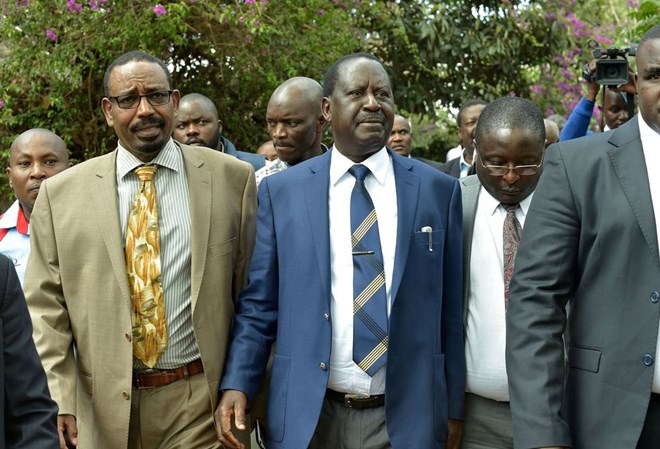
Tuesday October 31, 2017
By Felix Njini, Samuel Gebre, and Michael Cohen
Raila Odinga, center, arrives for a meeting in Nairobi on Oct. 31, 2017. Photographer: Simon Maina/AFP/Getty Images
Kenya’s main opposition alliance said it won’t challenge the results that gave President Uhuru Kenyatta a landslide victory in last week’s disputed election rerun in court and instead vowed to mobilize its supporters to press for a another vote.
“This election must not stand,” opposition leader Raila Odinga told reporters in Nairobi, the capital. “If allowed to stand, it will make a complete mockery of elections and might well be the end of the ballot as a means of instituting government in Kenya.”
Musalia Mudavadi, a senior leader of Odinga’s four-party National Super Alliance, said that while private citizens may challenge the election in court, the coalition won’t take legal action against the vote.
Election Boycott
Kenyatta, 56, secured 98.3 percent of the vote in an Oct. 26 election that the Independent Electoral & Boundaries Commission said was free and fair, but was boycotted by Odinga, who described it as a sham. The electoral agency said the turnout dropped to 38.8 percent from 79 percent in the Aug. 8 contest, which the Supreme Court nullified after the electoral agency failed to disprove opposition claims of rigging.
Ethnic tensions have also flared between members of Odinga’s Luo community and Kenyatta’s Kikuyu group, raising fears of a repetition of the widespread violence that ensued after a contested 2007 vote and claimed at least 1,100 lives.
EU Concern
“There is an urgent need for dialog between the two sides, for institutions to be given the space and security to work with full independence, and for grievances to be addressed through democratic and judicial channels,” a European Union observer mission said in a statement.
Bond investors indicated that they view the declaration of Kenyatta’s victory as the beginning of the end of the crisis, with the yield on the government’s international bonds due in 2024 tumbling 16 basis points to 6.16 percent since the announcement of the results.
Such optimism may be misplaced, according to Ben Payton, head of Africa at U.K.-based consultancy Verisk Maplecroft, who sees a strong likelihood of more violence in Odinga strongholds over coming days and further legal challenges to the election.
“Kenyatta will now rule over a country where huge swathes of the population believe he has usurped the presidency,” he said in a note to clients. “Even assuming Kenyatta survives in office, the government will face a loss of authority, particularly in western Kenya. Kenya’s ongoing electoral crisis demonstrates the reality that investors face an inherently volatile environment in East Africa’s largest economy.”
Economic Boycotts
The opposition alliance’s plans include staging protests and economic boycotts, and setting up a national People’s Assembly comprising the leaders of civil rights, business and religious groups and labor unions to press for fresh elections. It will also establish a task team that will identify weaknesses in the government and press for reforms.
We-The-People, a coalition of civil rights and religious organizations, labor unions, academics and other groups, described the political standoff as “an escalating crisis” that has been exacerbated, rather than resolved, by the election rerun.
“It has resulted in more disruption, death and violence,” the group said on Tuesday. “Kenya is in the grip of a massive security crisis, marked by impunity in state institutions.”
In his acceptance speech on Monday, Kenyatta said he expected his victory to be challenged again in court and that he would only consider talks with the opposition after the legal process had been concluded. Odinga, 72, a former prime minister who failed to secure the presidency in elections in 1997, 2007 and 2013, said his alliance is open to dialog if agreement can be reached on the terms of reference.
Reports of police using excessive force against protesters are deeply concerning and any officers who are found to have acted outside the law must be held to account, according to Robert Godec, the U.S. ambassador to Kenya.
“We appeal for calm in the coming days,” Godec said in a statement. “We call on all Kenyans to come together at this critical moment to reject the politics of hatred and division.”